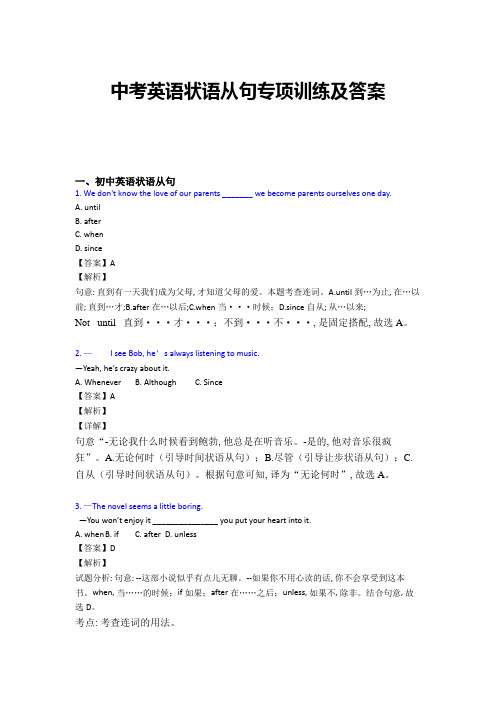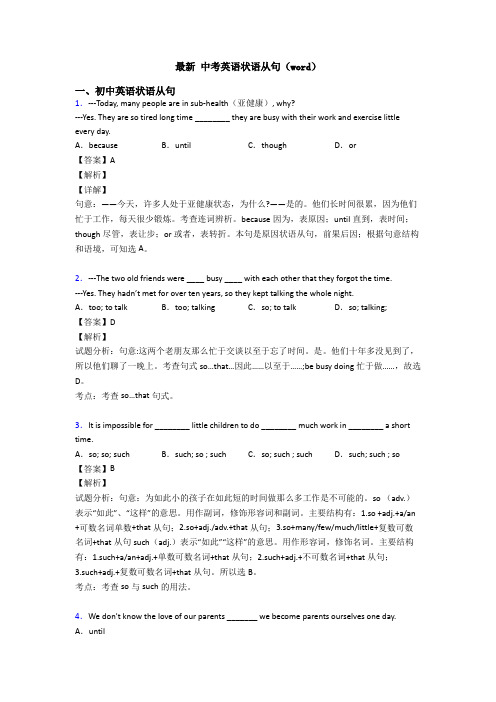最新中考英语精品复习 状语从句
- 格式:ppt
- 大小:409.00 KB
- 文档页数:11

中考英语:状语从句专题详解1.时间状语从句1)时间状语从句常用when as while before after since till until as soon as等连词来引导。
例如:It was raining hard( rain hard 下大雨)when got to school yesterday.While he was doing his homework the telephone rang.As he walked along(沿着走)the lake he sang happily.He had learned a little Chinese before he came to China.After he finished middle school he went to work in a factory.2)在时间状语从句里,通常不用将来时态,用现在时态表示将来的动作或状态。
例如:I’ll ring you up as soon as I get to New York.I will tell him everything when he s back.He won’t believe it until he sees it with his own eyes.3)在带有till或until引导的时间状语从句的主从复合句里,如果主句用肯定式,其含义是“一直到……时”,谓语动词只能用延续性动词。
如果主句用否定式,其含义是“直到……才……”“在……以前不……”谓语动词可用瞬间动词。
例如:The young man read till the light went out(熄灭).Let’s wait until the rain stops.We won’t start until BobDon’t get off(从下来)until the bus stops.【Till是指直到某一特定事件发生的时候,而在那个时刻之后,该事情或状况仍将持续。


状语从句一、时间状语从句1.引导时间状语从句的连词【知识拓展】时间状语从句的时态问题:在时间状语从句和条件状语从句中,主句如果使用一般将来时态,从句使用一般现在时表示将来,即所谓的"主将从现"。
As soon as I arrive in Beijing,I will ring you up.我一到北京就给你打电话。
You’ll fall behind the others unless you study hard.如果你不努力学习,你将会落后于其他人。
2.when,while,as引导时间状语从句的区别when,while,as显然都可以引导时间状语从句,但用法区别非常大。
①when可以和延续性动词连用,也可以和短暂性动词连用;而while和as只能和延续性动词连用。
Why do you want a new job when you’ve got such a good one already?你已经找到如此好的工作,为何还想再找新的?(get为短暂性动词)Sorry,I was out when you called me.对不起,你打电话时我刚好外出了。
(call为短暂性动词)Strike while the iron is hot.趁热打铁。
(is为延续性动词,表示一种持续的状态)The students took notes as they listened.学生们边听课边做笔记。
(listen为延续性动词)②when从句的谓语动词可以在主句谓语动作之前、之后或同时发生;while和as从句的谓语动作必须是和主句谓语动作同时发生。
a.从句动作在主句动作前发生,只用when。
When he had finished his homework,he took a short rest.(finished先发生)当他完成作业后,他休息了一会儿。
When I got to the airport,the guests had left.(got to后发生)当我赶到飞机场时,客人们已经离开了。



2024年中考英语专题复习精练—状语从句1时间状语从句一、单项选择1.—When did you finish your homework last night?—________ my mother came back from work.A.Until B.Not until C.Since D.As2.Love your parents ________ they are alive. Don’t wait until it is too late.A.while B.since C.because D.until3.—You look so tired. What’s wrong?—I didn’t go to bed ________ I finished watching In the Name of People last night.A.until B.if C.unless4.He will watch TV as soon as he ________ his work.A.will finish B.finish C.finishes5.— You didn’t answer my phone last night. What’s up?— Oh, I was so tired and I just fell asleep ________ I lay down on the bed.A.until B.though C.so that D.as soon as6.Just now, the managers kept arguing about the problem __________ they agree with each other. A.when B.although C.unless D.until7.—Dad, please tell me when Mum ________. I miss her very much.—She will return when she ________ her task. And she will bring a nice present for you.A.will return; finishes B.will return; will finish C.returns; will finish8.Time waits for no man. But some people won’t realize the importance of time ________ it’s gone. A.until B.as C.when D.since9.—Hey, Tony. ________ will the competition start? I can’t wait to watch.— ________ the famous scientist arrives here.A.When; Not until B.When; Until C.How long; Until D.How long; Not untilA.As soon as B.Before C.Since D.After11.My cousin will tell me about his trip after he _______ home tomorrow.A.arriving B.will arrive C.arrives D.is arriving 12.Time waits no man. But some people won’t realize the importance of time ________ it’s gone. A.until B.when C.since13.Bill and I are close friends. I have known him ________ he was born.A.when B.since C.while D.until 14.—Excuse me. When can we have the steak we ordered?—Not until it ________ in ten minutes.A.will be prepared B.is prepared C.has prepared D.was prepared 15.—Hello, may I speak to Mrs White?—I am sorry. She is in meeting now. I’ll call you back ________ she comes back.A.until B.as soon as C.before D.since16.—I don’t know if David ________ to have the meeting tomorrow.—Don’t worry. I will tell you as soon as he ________.A.comes; will come B.will come; comesC.will come; will come D.comes; comes17.—Why didn’t you try your best to get on the underground?—I tried to, but it started moving ________ I could get on it.A.before B.while C.as soon as D.after18.We were just ready to play basketball ________ it began to rain.A.as soon as B.before C.when19.I am going to buy a birthday present for Benny. Do you know________ ?20.Tina was too sleepy. She fell asleep ________ she was reading a book at the table.A.if B.while C.until参考答案:1.B【详解】句意:——你昨晚什么时候做完作业的?——直到我妈妈下班回来。

1. 时间状语从句常用引导词:when, whenever, as, while, as soon as, before, after, since, till,until。
特殊引导词:the minute, the moment, the second, every time, the day, the instant, immediately, directly, no sooner…than, hardly…when, scarcely…when。
例句①:As time went on, his theory proved to be correct.语法:这是一个主从复合句。
As引导的是时间状语从句。
译文:随着时间的推移,他的理论被证明是正确的。
例句②:The minute you do this, you'll lose control.语法:这是一个主从复合句。
The minute引导的是时间状语从句。
译文:你一旦做了这件事,就会失去控制。
2. 地点状语从句常用引导词:where。
特殊引导词:wherever, anywhere, everywhere。
例句①:A new school building was put up where there had once been a theatre. 语法:这是一个主从复合句,where引导的是地点状语从句。
译文:一所新的学校在以前的剧院处建成了。
例句②:Everywhere they went, the distinguished guests were warmly welcomed. 语法:这是一个主从复合句,Everywhere引导的是地点状语从句。
译文:贵宾们每到一处都受到了热烈欢迎。
3. 原因状语从句常用引导词:because, since, as, for。
特殊引导词:seeing that, now that, in that, considering that, given that。

2024届初中英语语法专题复习之九大状语从句引导词状语从句:在复合句中修饰主句中的动词、形容词或副词等的从句叫做状语从句。
状语从句根据它表示的意思的不同可分为时间、地点、原因、结果、让步、比较(或方式)和条件等类。
1. 时间状语从句时间状语从句引导词是指在复合句中充当时间状语的连词或名词短语。
常用的时间状语从句引导词包括when, before, after, while, as soon as, until, since等。
其中,当主句为一般将来时时,从句只能用一般现在时表示将来意义[1]。
此外,还有一些名词词组充当的时间状语从句引导词,如the moment, the minute, the second, the instant等,以及副词充当的时间状语从句引导词,如immediately, directly, instantly等[1]。
在复合句中,时间状语从句可以用来修饰主句中的动作或事件,起到限定时间、地点、原因等作用。
例如:“I will call you back later”中的时间状语从句“later”修饰主句中的动作“call you back”2. 条件状语从句条件状语从句是复合句中作条件状语的从句,用来说明主句动作发生或状态存在的条件。
能够引导条件状语从句的引导词主要分为两类:常用引导词和特殊引导词。
常用引导词包括if(如果)、unless(除非)、as/so long as(只要)、in case(万一;如果)、once(一旦)、only if(只有)等[1]。
特殊引导词包括supposing(that)(假如;如果)、on condition that(条件是)、provided(that)(倘若)等[1]。
其中,if表示在某种条件下可能发生某事;unless相当于“if…not…”结构,语气较强,其引导的从句中谓语不能再用否定形式;as/so long as表示说话人的希望、愿望或遗憾的心情等;in case引导条件状语从句时,表示在某种前提下;once表示一旦;only if表示只有3. 原因状语从句原因状语从句引导词通常由because, since, as, now that, not that…, but that…, seeing that, considering that, in that等引导。

中考英语常考状语从句1.时间状语从句When/while/as, since, as soon as, until/till, before, after,once, by the time, the minute/ the moment(一...就...), every/each time, whenever,...(1) When & while &as①When:表示“当...时”,后面跟时间点、时间段均可,因而从句的动词可以是非延续性动词(又叫短暂性动词)或延续性动词。
例如:He was watching TV when his mom came back.当他妈妈回来时,他正在看电视。
When his mom was cooking, he was watching TV.当他妈妈做饭的时候,他正在看电视。
②While:表示“当..时”,后面只能跟时间段,因而从句的动词也只能是延续性动词,且常为进行时态(现在进行时或过去进行时)。
例如:While his mom was cooking, he was watching TV.当他妈妈做饭的时候,他正在看电视。
③as:表示“一边...一边...”【注意】与while区分:当一个人同时进行两个动作时(即主从句的主语是同一个人时),只能用as。
还可表示“随着...”。
例如:Tom sings as he works. Tom一边唱歌一边工作。
As time went by, I learned how to be strong.随着时间的流逝,我学会了如何变得坚强。
(2) until & till (介词/连词)until:表示“直到...”,表示某个动作或状态一直持续到...为止。
例如:They waited until/till their mom came back.他们一直等到妈妈回来。
(主句谓语动词为延续性动词)“not...until”表示“直到...才”。

中考英语状语从句专项训练及答案一、初中英语状语从句1. We don't know the love of our parents _______ we become parents ourselves one day.A. untilB. afterC. whenD. since【答案】A【解析】句意: 直到有一天我们成为父母, 才知道父母的爱。
本题考查连词。
A.until到…为止, 在…以前; 直到…才;B.after在…以后;C.when当···时候;D.since自从; 从…以来;Not until 直到···才···;不到···不···, 是固定搭配, 故选A。
2. — I see Bob, he’s always listening to music.—Yeah, he’s crazy about it.A. WheneverB. AlthoughC. Since【答案】A【解析】【详解】句意“-无论我什么时候看到鲍勃, 他总是在听音乐。
-是的, 他对音乐很疯狂”。
A.无论何时(引导时间状语从句);B.尽管(引导让步状语从句);C.自从(引导时间状语从句)。
根据句意可知, 译为“无论何时”, 故选A。
3. —The novel seems a little boring.—You won’t enjoy it _______________ you put your heart into it.A. whenB. ifC. afterD. unless【答案】D【解析】试题分析: 句意: --这部小说似乎有点儿无聊。
--如果你不用心读的话, 你不会享受到这本书。
when, 当……的时候;if如果;after在……之后;unless, 如果不, 除非。

中考英语专题复习《状语从句》一、单项选择1.Our classroom won’t be clean ________ we clean it every day.A.after B.while C.unless D.because 2.The little boy won’t go to sleep unless his mom _________ him a story.A.tells B.told C.is telling D.will tell 3.My pen friend knows a lot about China ________ she has never been here. A.although B.if C.because D.until4.A five-minute rest will refresh your mind ________ you feel stressed with schoolwork. A.unless B.because C.although D.when5.It will cost you a lot of money ________ you choose to buy a flat in the city centre. A.if B.although C.so that D.unless 6.________ we walked into the museum, we saw thousands of beautiful butterflies. A.Now that B.As soon as C.Although D.So that 7.________ Jill isn’t feeling well today, ________ he still goes to school. A.Although; but B.But; although C.Although; /D.but; although 8.Tina keeps the good habit of checking her test paper ________ she finishes it.A.as if B.in order that C.now that D.as soon as 9.It’s raining outside. Stay at home ________.A.if you have an umbrella B.since it stopsC.after it stops to rain D.till it stops10.Mr. Zhao has given much money to Project Hope ________ he is not so rich.A.if B.though C.because D.unless 11.I don’t know if it _________ tomorrow, but if it _________, I’ll stay at home. A.will rain; rains B.will rain; will rain C.rains; will rain D.rains; rains 12.—Hurry up, Tony! We don’t have much time.—Look at the heavy rain! I’m afraid ________ we take a taxi, we’ll still miss the train. A.if B.unless C.so that D.even if 13.We still know little about the Moon ________ men have landed on it.A.since B.though C.if D.because 14.Tom has studied very hard ________ he came to our school.A.since B.when C.before D.while 15.—Do I have to attend the ceremony on Thursday?—Oh, don’t come ________ you are busy.A.and B.but C.if D.so16.You never really understand a person ________ you consider things from his point. A.until B.while C.because D.if17.I think our middle school life is colourful and meaningful ________ I am always busy with schoolwork.A.because B.unless C.though D.as18.Dad sometimes goes to the supermarket with us ________ he hates going shopping. A.because B.so C.though D.if 19.—Mom, I’m already 11 years old. Can I ride a shared bike?— No. You’re not allowed to do that _______ you are 12.A.when B.after C.until D.as 20.Teenagers should do some housework ________ they finish their homework.A.until B.but C.after D.unless21.Li Hong still failed the exam yesterday, ________ she tried her best.A.if B.because C.though D.unless 22.Many wild animals don’t have a safe place to live, ________ villages and farms are growing bigger and taking away their land.A.because B.until C.although D.before23.I don’t have to introduce her to you ________ you know the girl.A.until B.unless C.since D.but24.If the singer ________ to Hechi ________ September 20th, please call me.A.will get; on B.gets; on C.gets; in D.get; in25.________ the weather improves, we’ll have to cancel the outdoor picnic.A.Unless B.If C.Because D.When26.I won’t go to the movies this afternoon ________ I’m free.A.or B.unless C.because D.than27.You will not get the special gift ________ you finish all the tasks.A.after B.because C.while D.unless 28.—What’s Cindy’s weekend plan?—If it doesn’t rain, she ________ a trip to the Great Wall with her cousin.A.takes B.took C.will take D.is taken 29.—Do you always sleep with the window open?—Yes, _________ it’s really cold.A.unless B.since C.because D.if30.—It is impossible to finish the difficult task in such a short time on my own ________ both of us work together.—No problem. Let’s start!A.if B.but C.because D.unless二、完成句子31.如果你放弃,你就会落后。


最新中考英语状语从句(word)一、初中英语状语从句1.---Today, many people are in sub-health(亚健康), why?---Yes. They are so tired long time ________ they are busy with their work and exercise little every day.A.because B.until C.though D.or【答案】A【解析】【详解】句意:——今天,许多人处于亚健康状态,为什么?——是的。
他们长时间很累,因为他们忙于工作,每天很少锻炼。
考查连词辨析。
because因为,表原因;until直到,表时间;though尽管,表让步;or或者,表转折。
本句是原因状语从句,前果后因;根据句意结构和语境,可知选A。
2.---The two old friends were ____ busy ____ with each other that they forgot the time.---Yes. They hadn’t met for over ten years, so t hey kept talking the whole night.A.too; to talk B.too; talking C.so; to talk D.so; talking;【答案】D【解析】试题分析:句意:这两个老朋友那么忙于交谈以至于忘了时间。
是。
他们十年多没见到了,所以他们聊了一晚上。
考查句式so…that…因此……以至于……;be busy doing忙于做……,故选D。
考点:考查so…that句式。
3.It is impossible for ________ little children to do ________ much work in ________ a short time.A.so; so; such B.such; so ; such C.so; such ; such D.such; such ; so【答案】B【解析】试题分析:句意:为如此小的孩子在如此短的时间做那么多工作是不可能的。

中考英语语法精讲丨状语从句状语从句一、时间状语从句1、when的用法(1)when既可引导一个持续性动作,也可引导一个短暂性动作,可用于表示主句和从句动作同时发生或从句动作先于主句动作,有时还可表示从句动作后于主句,意为“当。
时候”。
(2)when在be about to do。
when。
,be doing。
when。
,had done。
when。
,be on one’s way。
when。
,be on the point of doing。
when。
等结构中,作“那时突然”讲。
(3)when “既然、鉴于;尽管,虽然(位于主句之后);如果”2、while的用法(1)表示“当。
时候”,引导的动作必须是延续性的。
(2)用作并列连词,表示相对关系“然而”。
(3)引导让步状语从句,相当于although,意为“虽然”,位于主句前。
(4)引导条件状语从句,相当于as/so long as,意为“只要”。
3、as 的用法(1)表示“当。
时候”,强调同时发生,不指先后。
(2)说明两种正在发展或变化的情况,表示“随着”,表示时间的推移。
(3)表示“一边。
一边。
”。
(4)强调两个动作紧接着发生。
(5)表示“虽然,尽管”。
(6)其他含义“正如,正像”,“作为”,“由于,因为”。
4、before的用法(1)一般意为“在。
之前”“。
才”,“。
就”“还没有。
”“免得”“不知不觉”“宁可,宁愿”,“否则,要不然”。
(2)It + will be/was + 时间段+before+一般现在时/一般过去时。
在肯定句中,意为“多长时间之后才”;在否定句中,意为“用不了多长时间就”。
5、until和till(1)与肯定句连用,必须是延续性动词。
(2)与否定句连用,必须是非延续性动词,表示“直到。
才,在。
之前不。
”。
注意:not until可用于强调句和倒装句强调句:It is/was not until…that…倒装句:not until 放句首时,主句要部分倒装。


中考状语从句知识点归纳状语从句是英语中用来修饰动词、形容词、副词或整个句子的从句,它通常由一个引导词(如when, if, because等)引导,并在句子中承担时间、地点、原因、条件、目的、结果、让步等状语成分。
中考中,状语从句的考查是英语语法的重点之一,下面对中考状语从句的知识点进行归纳。
# 状语从句的分类1. 时间状语从句:表示动作发生的时间,常用引导词有when, while, as soon as等。
- 例如:When I arrived, he was still sleeping.2. 地点状语从句:表示动作发生的地点,常用where引导。
- 例如:Where there is a will, there is a way.3. 原因状语从句:说明发生某事的原因,常用because, since, as等引导。
- 例如:We are happy because we have achieved our goal.4. 条件状语从句:表示某事发生的条件,常用if, unless, provided that等引导。
- 例如:I will go to the party if I finish my homework.5. 目的状语从句:表示动作的目的,常用so that, in order that等引导。
- 例如:He studied hard in order that he could pass the exam.6. 结果状语从句:表示某事的结果,常用so...that, such...that 等引导。
- 例如:He was so tired that he fell asleep at his desk.7. 让步状语从句:表示尽管有某种情况,但仍然发生某事,常用though, although, even if等引导。
- 例如:Although it was raining, we still went out for a walk.# 状语从句的使用要点- 状语从句需要与主句在时态上保持一致,但有时主句使用将来时,从句使用现在时表示将来。

中考英语《状语从句》知识总结:定语从句与状语从句状语从句是从句与主句之间存在逻辑上的因果关系,用来描述主句中的动作、情态或条件。
状语从句可以修饰谓语动词、形容词、副词等,以增加句子的信息量和表达能力。
而定语从句则是用来修饰一个名词或代词,起到限制或补充其含义的作用。
一、状语从句1. 时间状语从句:描述主句动作发生的时间。
常见引导词有when, while, as, before, after, since, until等。
例句:He always takes a walk in the park when he finishes his work.2. 地点状语从句:描述主句中动作发生的地点。
常见引导词有where, wherever等。
例句:I can find my keys wherever I go.3. 原因状语从句:描述主句中动作发生的原因。
常见引导词有because, as, since等。
例句:I didn't go to the party because I was sick.4. 结果状语从句:描述主句中动作的结果或后果。
常见引导词有so, therefore, thus, hence等。
例句:It was raining heavily, so I stayed at home.5. 条件状语从句:描述主句中发生动作的条件。
常见引导词有if, unless, provided that等。
例句:If it snows tomorrow, we can go skiing.6. 目的状语从句:描述主句中动作的目的。
常见引导词有in order that, so that等。
例句:I'm taking extra English classes so that I can improve my speaking skills.7. 方式状语从句:描述主句中动作的方式或方法。